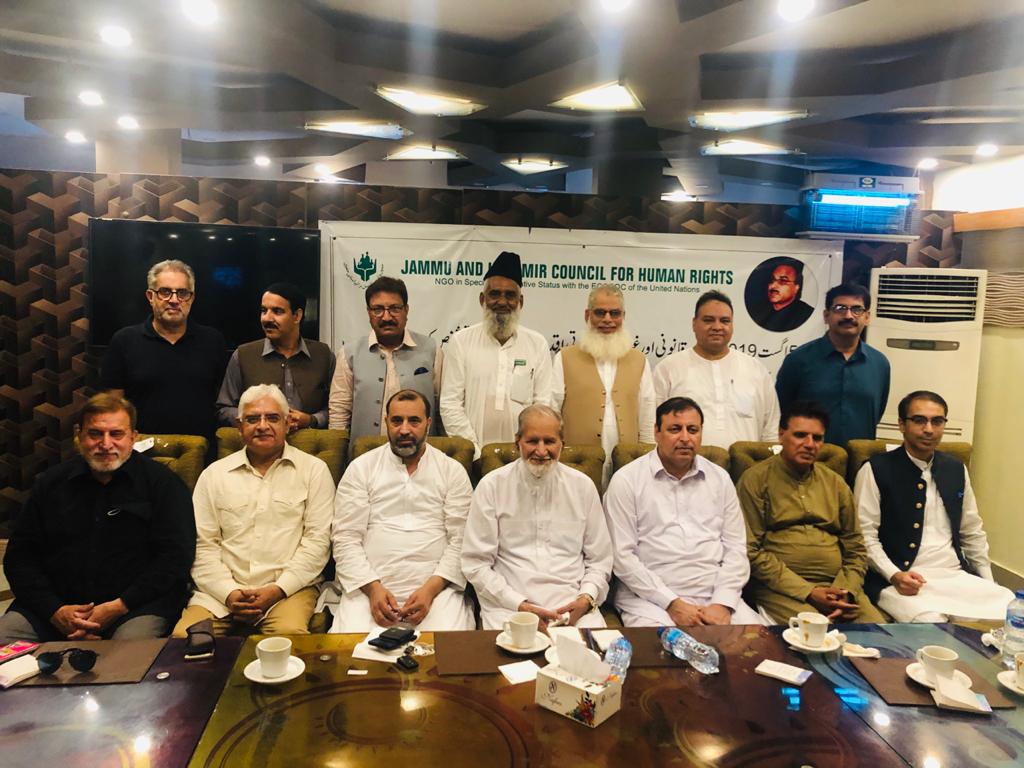Welcome to my Blog

You may be following me on Facebook, WhatsApp and X. I appreciate your kind and valuable interest. This blog is dedicated to elucidating the various variables of Kashmir Case. Here, we will explore the jurisprudence of Kashmir case. Kashmiris are not a subordinate people; their title is based on the principle of equality. Constituency of Reliable Information There is an urgent need to enlarge the constituency of reliable information and knowledge about Kashmir case. It will include interpretation of the title of the people to self-determination, explaining the United Nations’ template and the interpretations of the respective Indian and Pakistani claims. The Indian and Pakistani claims are a consequence of the Kashmiri people’s title to self-determination. June 2018 and July 2019 UN High Commissioner for Human Rights Reports have asked India and Pakistan to “Fully respect the right of self-determination of the people of Kashmir as protected under International Law. You have to be vigilant. Government of Pakistan has failed to spot that these two UN Reports have referred to Indian Administered Kashmir no less than 17 times as “Indian State of Jammu and Kashmir”. Unfortunately, not a single person from the Government of Azad Kashmir, its administration, judiciary, civil society, or general citizenry has raised concerns with the Government of Pakistan regarding this terminology. It has appeared 9 times in the 2018 report and 8 times in the 2019 report. We need a modern-day Diogenes with his lantern to keep a sharp vigil. Independent and Sovereign StateThe political arrangement of Jammu and Kashmir with the British Crown came to an end on 15 August 1947. Maharaja of Kashmir was under the Paramountcy of the British Crown before the partition of India from 15.8.1947 under section 7, Indian Independence Act. The Suzerainty of the Crown over Jammu and Kashmir lapsed and all functions exercisable by His Majesty at that date with respect to the State of Jammu and Kashmir, all obligations of His Majesty towards the Jammu and Kashmir State or the ruler thereof and all powers, rights, authority or jurisdiction exercisable by the Crown at that date in relation to the State of Jammu and Kashmir by treaty or otherwise lapsed and the State became an independent and sovereign State in the full sense of the International Law. “Thus whatever limits to the sovereignty of His Highness in relation to matters coming within the sphere of paramountcy existed before 15.8.1947, these ceased to exist and His Highness became an uncontrolled and absolute sovereign even in relation to such spheres from that.” (Janki Nath Wazir CJ and Shahmiri J in Magher Singh v Principal Secretary J & K Government 1953). Jammu and Kashmir State, by virtue of an Instrument of Accession made on 26 October 1947 ceded a limited authority specified in Section 6 (1) (a) in regards to Defence, External Affairs and Communication to the Dominion of India. Clause 8 of the Instrument of Accession runs as follows: “Nothing in this Instrument affects the continuance of my sovereignty in and over this State, or save as provided by or under this Instrument the exercise of any powers, authority and rights now enjoyed by me as Ruler of this State or the validity of any law at present in force in this State.” It is a clear and express reservation. No change whatsoever was affected in the residuary sovereignty of the State or the power of its Ruler so far as the succession of the State to the Dominion of India is concerned. The residuary sovereignty of the State and the powers of its ruler in matters other than those specified in the Instrument of Accession remained unaffected. Promise made to the Government of KashmirOn 27 October 1947, the Governor-General of India, Lord Mountbatten of Burma, informed the Maharaja of Kashmir: “In response to your Highness’ appeal for military aid, action has been taken today to send troops of the Indian Army to Kashmir to help your own forces to defend your territory and protect the lives, property, and honour of your people.” The Governor-General made it clear that this military support was conditional. He stated: “In accordance with the policy that in the case of any State where the issue of accession has been the subject of dispute, the question of accession should be decided in accordance with the wishes of the people of the State, it is my Government’s wish that as soon as law and order have been restored in Kashmir and her soil cleared of the invader, the question of the State’s accession should be settled by a reference to the people.” Indian army remains as a sub-ordinate force under the State administration and a supplement to Maharaja’s forces. The ultimate decision regarding Kashmir’s accession was to be made through a democratic process, reflecting the will of the Kashmiri people. Promise made to the Government of PakistanIn a telegram dated 27 October 1947, the Prime Minister of India assured the Prime Minister of Pakistan with the following statement: “I should like to make it clear that the question of aiding Kashmir in this emergency is not designed in any way to influence the State to accede to India.” This assurance, conveyed from one Prime Minister to another, is a significant state document. Given the developments of that time, Pakistan was understandably concerned. The Prime Minister of India provided further reassurance with these words: “I should like to make it clear that the question of aiding Kashmir in this emergency”—referring to efforts to eliminate tribal incursions and quell the rebellion—”is not designed in any way to influence the State to accede to India. Our view, which we have repeatedly made public, is that the question of accession in any disputed territory or State must be decided in accordance with the wishes of the people, and we adhere to this view.” In a subsequent telegram dated 31 October 1947, the Prime Minister of India reiterated to the Prime Minister of Pakistan: “Our assurance that we shall withdraw

